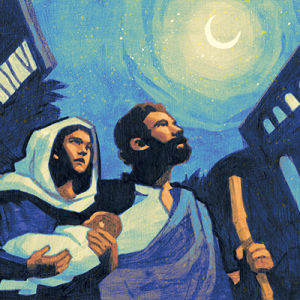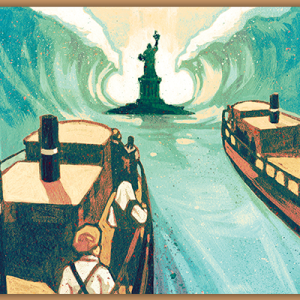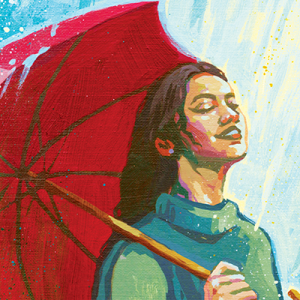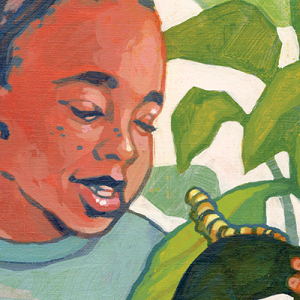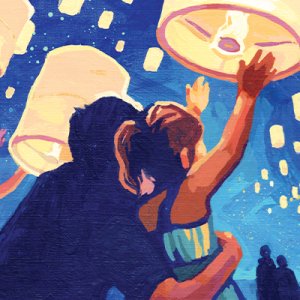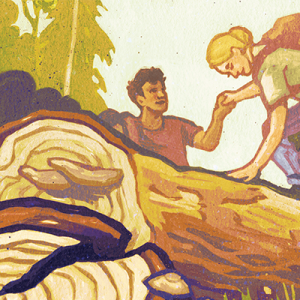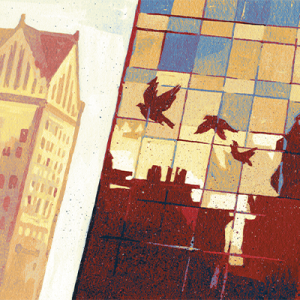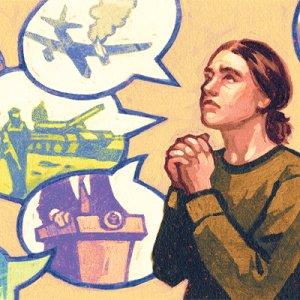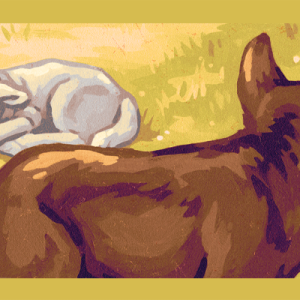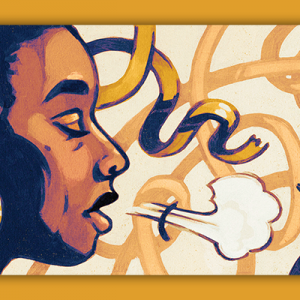
Dong Hyeon Jeong is an associate professor of New Testament Interpretation at Garrett-Evangelical Theological Seminary in Illinois. He is the author of Embracing the Nonhuman in the Gospel of Mark.
Posts By This Author
Honoring the Prophets Among Us
December reflections on scripture from the Revised Common Lectionary, Cycle A.
IN ADVENT, I remember and am grateful for all the prophets who show us the way of the divine. They invite us to remember and live out God’s command to love each other as much as we love God. I call to mind biblical scholar Walter Brueggemann, who passed away this year. He was a mentor, teacher, and colleague to many, including me. He taught us to prophetically reimagine a world where we challenge dominant and oppressive ideologies while compassionately re-envisioning a more just world. His magnanimous presence and prophetic words will be missed.
I also remember the young—led by Mary, the mother of Jesus—who invite us to be prophetic during adversity. With the guidance of Osvaldo D. Vena, we are invited to dream dreams in the joyous playground of God. Grounded in the abundance of God in our lives, I celebrate with Son Kyung Min’s praise song “Grace,” which I highly recommend for personal devotion and corporate worship services. The music grounds me in my faith and prompts me to remember how surrounded I am by God’s love.
As we approach the season of Christmas, let us pay close attention to the needs of our neighbors, especially our international students and immigrant neighbors. Every moment provides an opportunity for us to share the gift of the redemptive love of God.
A People Yearning To Breathe Free
November reflections on Scripture from the Revised Common Lectionary, Cycle C and A.
I WRITE THIS month’s reflections with a heavy heart as the federal government’s violent attacks on immigrants continue. As a Korean-descent immigrant, I understand how scapegoating, hatred, and being blamed for things beyond our control can be exhausting for body and soul. Our communities are on the brink of despair; our hopes for a better future are shattering.
And yet, we hold on to our faith. We know we are not alone. God is our refuge. We have friends, colleagues, and neighbors who are in solidarity with us and who pray for us. As we face lawlessness geared with imperial might, we believe that our God, the only true “king,” will “judge between the nations” and “settle disputes.” Then we will beat “swords into plowshares” and “spears into pruning hooks.” God is the ultimate judge of all (Isaiah 2:4).
The transformative path of Zacchaeus inspires me. His story is a model of faithfulness. Whether or not you claim Jesus as your savior, I believe that you can change by caring for the poor and oppressed, participating in reparations, and sharing your abundant gifts. After all, the gospel says so.
God’s Love Doesn’t Fade
AMID RESISTANCE AND the fight for liberation, we must be humble, seek God’s mercy and love, and be willing to learn from one another. We cannot go around virtue signaling while believing we have no shortcomings.
This month’s reflections focus on repentance. I seek to confess and repent. Not with false humility or performative self-deprecation, but to be genuinely self-critical as I examine my conscience. The passages from Jeremiah and the psalms tremendously help with reorienting ourselves and our moral compass toward God. The New Testament readings strengthen us to continue doing the godly and righteous work of the Spirit. Luke reminds us that following Christ is challenging and that we are often lost due to our sins. The writer of 1 Timothy extends an invitation to repent.
We are continuously called to heal the wounds of our neighbors (and ourselves). Economic injustice creates many wounds for the poor as well as the rich. Luke’s gospel challenges us to reorient our relationship with money and economic systems in radical ways. We have heard the aphorism “For the love of money is a root of all kinds of evil” (1 Timothy 6:10). Luke challenges us to go deeper, to revisit our relationship with material excess in ways that are not only uncomfortable, but also structurally disruptive. Please join me as we seek God’s guidance in our collective journey of repentance, resistance, and reconciliation.
Listen Truly, Wisely, Deeply
LISTENING IS ONE of the most important postures in engaging with the gospel. As Jesus says, “If you have ears to hear, then hear!” (Mark 4:9). This month, we listen to the cloud of witnesses who have shared with us their encounters of the divine. We listen not as passive recipients who accept what is presented unquestioningly; only oppressive systems demand that people listen without asking questions. Rather, Jesus invites us to listen (as we ask and question) because doing so acknowledges the presence of the divine in each one, no matter how different their thoughts may seem from ours.
These reflections open by listening to African American ancestors who have taught us how to read the Bible in ways that are liberating and just. We will also listen with the biblical Samaritans, considered “outsiders” at the time, who provide us with opportunities for self-critical reflections. Next, we recall the breath of God, the Holy Spirit, who inspires us to do good works. Finally, the wise words of the so-called Korean “comfort women” also teach us to listen.
In our world we are bombarded by noise and loud opinions that smother the soul. Listening these days may seem an overwhelming task. We crave quiet and peace. But Jesus calls us to listen carefully and intentionally to voices that are silenced and suppressed. We also must listen wisely.
Light for the Journey in Dystopian Times
August reflections on scripture from the Revised Common Lectionary, Cycle C.
FOR MANY OF us, 2025 feels like George Orwell’s 1984. Some Christians profess their faith in God while cutting off support systems for people who are weak and poor. They kneel down and pray for their policies to pass — policies that will hurt the marginalized. I want God’s mighty hands to swoop down and protect us from this dystopian reality. I catch myself hoping for an extreme divine intervention. Desperation can make us long for a quick solution.
Thankfully, the passages for this month guide us to the realization that there is another way. There are “clouds of witnesses” who have shown us how to traverse the fires and divisions in our lives. Trusting in God is also learning from people (and even towns) who have shown us what it means to love God and love our neighbors near and far. I lift up the names of Ruby Bridges, my friend John, the city of Skokie, Ill., and other witnesses who have shown me how to trust in God in ways that are liberating and healing.
Who are in your clouds of witnesses? Who has shown you what it means to love God and your neighbors? Today and for this month, I hope that you will invoke their names as we journey together in this dystopian time.
God’s Love Cracks Categories
July reflections on scripture from the Revised Common Lectionary, Cycle C.
WE HAVE COME to the point in U.S. Christianity when many declare that loving one’s neighbor is optional. I am not sure how anyone can read the Bible and still think that God does not mind if I care less for those who are not my immediate family.
This month’s reflections are all about caring for the other. God’s love is boundless, and we are the recipients of God’s enduring mercy; thus, we can also share a part of ourselves with our neighbors near and far. God’s bountiful love is evident in the stories of Naaman and the good Samaritan. Modern-day prophet Kendrick Lamar’s voice encourages us to be humble and to remember that we are each other’s keepers. Finally, we are invited to reflect on what it means when we hear unwelcome, and horrifying, knocks on doors.
Some public figures have expressed a preoccupation with the order of people whom we are called to love first. By advocating an unnecessary and arbitrary hierarchy, the order of love is distorted into an order of hate. Yes, we love God first as Christians. Such preferential love for God is manifest in how we show God’s love to all. We can do this because the Holy Spirit empowers us to love. If we truly have Christ’s love within us, then the sanctifying grace in us overflows because God’s love knows no bounds. God’s love traverses all concentric circles that we can imagine.
Relying on the Spirit in Trying Times
June reflections on scripture from the Revised Common Lectionary, Cycle C.
THE POLITICAL ENVIRONMENT in this country has caused great concern among many of us, Christian and otherwise. This month’s scripture passages spark various theological and socio-political hauntings that shed insight for us on how to respond.
For instance, we need to understand that God does not seek the destruction of creation to manifest God’s plan. No calamity can be justified as somehow being “God’s intention.” In addition, we need prophetic peace with all of God’s creation. This peace demands justice and reparations. I continue to pray for Palestine, Israel, and other nations where violence abounds. Third, we stand with all the queer people who are experiencing tremendous hardships because of intentional policy choices. Fourth, we will not be fooled by hate speeches that pretend to be freedom speeches. Words matter. We are responsible for what we say on any platform or in any capacity.
Our circumstances require us to respond, in whatever ways we can and on the issues that speak particularly to us. As we do so, even while we create room for self-critique, we are invited to be generous and patient with ourselves as we seek to navigate as wisely as possible these challenging times.
Choosing To Seek Hope and Joy
May reflections on scripture from the Revised Common Lectionary, Cycle C.
THE EASTER SEASON provokes a desire in me to find hope and joy again. I don’t want to wallow in misery just because my limited vision can see only a bleak future. Instead, I am choosing to seek hope and joy because I believe that God does indeed empower and guide us. I claim the daily practice of putting my hope in the divine, not our human condition. God seeks our well-being. We must remember this amid the onslaught of trauma brought on by humanity failing to do the right thing.
The post-Easter reflections are more positive in tone. I chose to be optimistic because life goes on, we still have good work to do, and the fight does not end. We still have to care for one another, and we hope that others will care for us. In all of these, I hope that we will find once again the power of prayer and divine love. There are resources we can seek for help, guidance, and support, and I am one of many who have received such generosity and kindness. I invite you to find your own versions of the divine and/or the mystical. The immaterial and unseen surround us, guiding us, especially in our moments of despair and need.
I end my reflection with a prayer for people and nations that are going through turmoil and upheaval. Join me in offering a prayer that we may bring peace wherever we can.
Lions, Jackals, and a Bloodied Lamb
April reflections on scripture from the Revised Common Lectionary, Cycle C.
IN THESE UNCERTAIN times, I look for witnesses who will guide me to a more hopeful future. I do so because I cannot overcome my anxieties alone. I recognize the affective, spiritual, and communal dimensions of healing and recovery. When we heal and witness together, we are emboldened to witness the life-giving hope of the divine with the other more than ever.
In this month’s reflections, I see various sources of hope and witnessing. Beyond anthropocentrism, I see that nonhumans, particularly jackals and ostriches, are guiding us in our relationality with the divine and others (Isaiah 43:16-21). In responding to trauma, I seek the wisdom of women (“daughters of Jerusalem”) who have been down this road before (Luke 23:27-31). With their guidance, I hope for a peaceable kingdom that is unmitigated by false hopes and spiritual bypassing.
My last reflection engages Thomas the Twin (John 20:19-31) and the inauguration of Donald Trump for a second time. Here, I offer a weary posture of the discombobulated mind that is still trying to grasp the impact of his inauguration. I am trying to breathe amid a sense of despair. So, I hope that you will breathe as well, say a prayer or two, talk with a trusted friend, be with your animal companion, and relish your personal solitude. In all ways, I hope that you will find hope as you witness and become witnesses of social holiness.
Restoring Our Connective Tissues
March reflections on scripture from the Revised Common Lectionary, Cycle C.
WE LIVE IN a ruthless world that exhausts our bodies and souls. We are constantly bombarded with messages, reels, texts, and images that set our moral compasses spinning. As seekers of a more just world, the pressure to respond overwhelms us as we have never seen before. And so, I ask: When was the last time you intentionally cared for your body and soul?
The guilt one feels when one rests is a manifestation of how oppressive systems have convinced us that to rest and breathe is contrary to the necessities and requirements of a functioning society. And yet, we must breathe because the fight for a more just world is not only outside of us. It is also in us.
This month’s lectionary readings invite us to first breathe. Then, as we breathe, we are invited to become peacemakers, witnesses of righteousness, justice-seekers, and reconciling siblings. All these invitations are heavy. They are easier said than done. Many of us have probably responded to such invitations a long time ago. Our wounds and scars tell stories of what happens when we say yes.
Scars are marks of healing from yesterday’s struggles. To breathe is to reconnect the tissues of interdependence and mutuality that sustain our work for a more just world. To breathe does not neglect the issues at hand; rather, it helps us remember that we have divine witnesses who are sustaining us here and now.
